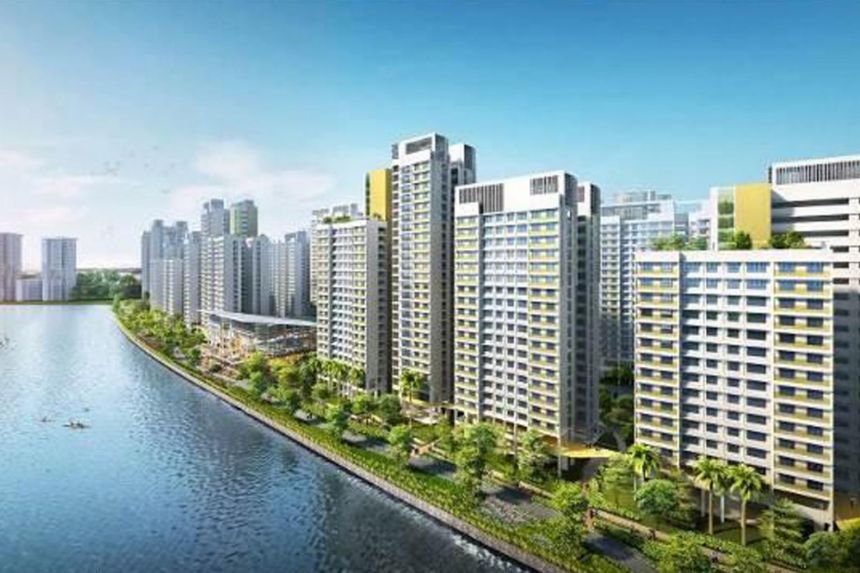First batch of 1,402 smart-enabled BTO flats in Punggol ready by end of the year

SINGAPORE – Slightly more than 1,400 families will be the first to live in smart-enabled Housing Board flats in Punggol Northshore by the end of this year.
Spread across two Build-To-Order (BTO) projects, Northshore Residences I & II, the flats are equipped with the “brains” of a smart home – smart power sockets and high-tech distribution boards.
These built-in fittings enable home owners to transform their flats into smart homes, should they wish to. This means that just about any appliance that is connected to a power source – lights, fans and coffee makers – can be controlled through a mobile application.
The 1,402 units in 12 residential blocks are the first batch of smart-enabled BTO flats to be rolled out by the HDB. Key collection for these blocks is currently under way.
On top of that, Punggol Northshore, one of seven waterfront housing districts in Punggol, will be the first district in Singapore to have smart features incorporated throughout.
Sensors will be deployed to analyse the performance of key estate services, such as lighting, water pumps, lifts and waste collection, for predictive maintenance.
Within the estate, sensor-controlled smart lighting in common areas with little to no human traffic detected can be dimmed automatically to 30 per cent, potentially saving up to 60 per cent on energy usage.
A smart irrigation system, which uses moisture sensors, considers factors such as rainfall and sunlight to optimise water schedules and usage. This makes for a water-efficient and less labour-intensive approach to maintaining greenery and landscapes within the estate.
On Friday (Oct 9), the HDB laid out how Punggol, one of the newest towns in Singapore, was developed as a smart and sustainable town over the past decade.
The journey first started with Treelodge@Punggol, Singapore’s first public housing development with eco-friendly features.
Completed in 2010, the eco-precinct comprises seven residential building blocks, with a podium carpark and green spaces at the precinct level.
The guiding design principle was “to harness the elements of nature wherever possible, such as wind, daylight, rainfall and greenery, to promote sustainable green living”, said the HDB.
To achieve that, the roof of the carpark was turned into an “eco-deck” with extensive greenery, including a community garden.
To encourage recycling and for ease of convenience, a centralised refuse chute for recyclable materials was incorporated in each block.
Treelodge @ Punggol was also the first public housing development to have solar photovoltaic panels on rooftops. The energy generated is almost enough for powering common services such as lift operations and lighting in common areas.
Since then, 169 blocks in Punggol have been fitted with solar panels, while installation works at another 300 blocks are in progress.
Along the way, Punggol also serves as a “living laboratory” where HDB tests out new ideas and technologies.
Features that are successfully trialled in Punggol will then be replicated in upcoming developments such as the new “forest town” of Tengah.
Of these, 22 solutions have been implemented beyond Punggol, such as the centralised recycling chutes and energy-saving LED lighting with motion sensors.
The smart features within the units in Northshore Residences were the biggest draw for graphic designer Haris Rasid, 28. He and his wife decided to get their first family home in Punggol, even if that meant not living near their parents in the western part of Singapore.
“The estate comes with so many smart features and living in this current era where technology is key, my wife and I thought that we would give it a try and be one of the first owners of a smart HDB flat,” said the father-of-one.
Their four-room flat in Northshore Residences II is being renovated and they expect to move in at the end of the month.
“In the beginning, I plan to use the smart features to keep track of our utility usage just to get the hang of the system as it is new to us. Maybe some time in the future, we’ll look at branching out into other smart appliances and systems,” he said.
- Harnessing solar energy
Solar panels on roofs of HDB blocks generate energy to power common services such as lift operations and lighting in common areas, coupled with energy-saving LED lighting.
Total energy savings: 82.6 GWh per year, which is the equivalent of powering 17,200 four-room flats a year.
- Water saving
New flats in Punggol come with water-efficient fittings to cut down on household water consumption. Within housing projects, a urban water harvesting system collects and stores rainwater for non-potable uses such as washing of corridors and landscape irrigation.
Total water savings: 1,387,818 cubic m per year, which is the equivalent of 555 Olympic-sized swimming pools.
- Minimising waste
All blocks in Punggol have a centralised recycling chute to promote household recycling.
Amount of recyclables collected: 1,285 tonnes a year, which is the equivalent of 89 double-decker buses.
- Greener transport
When completed, Punggol will have more than 50km of cycling paths. The town will have conveniently located dual bicycle racks to encourage green commuting.
At 5.2km per sq km, Punggol’s completed cycling network will be denser than Helsinki’s 4.7km per sq km.